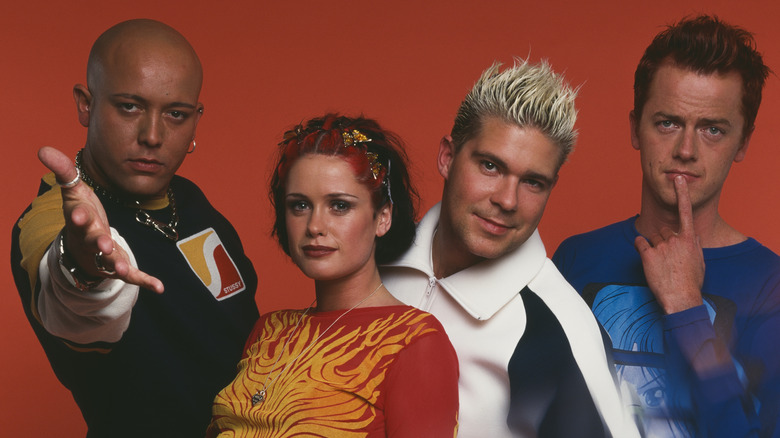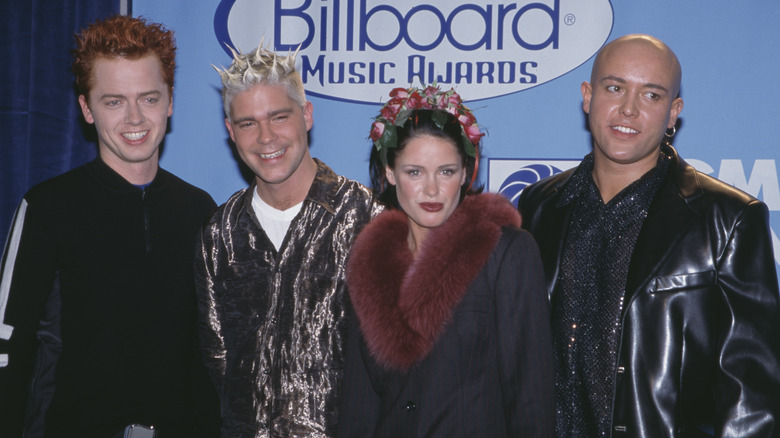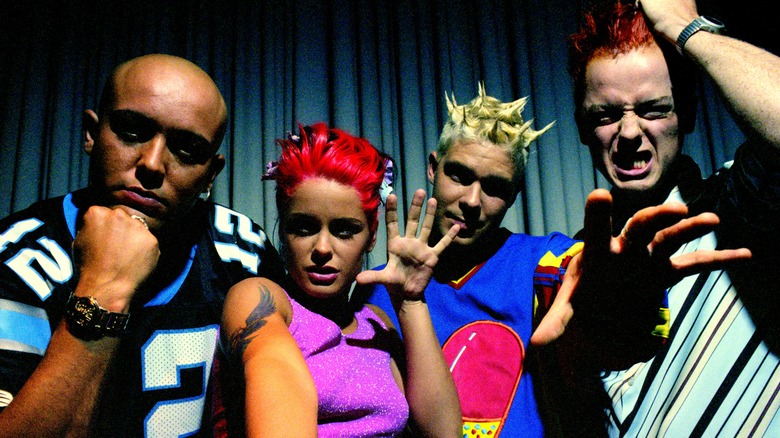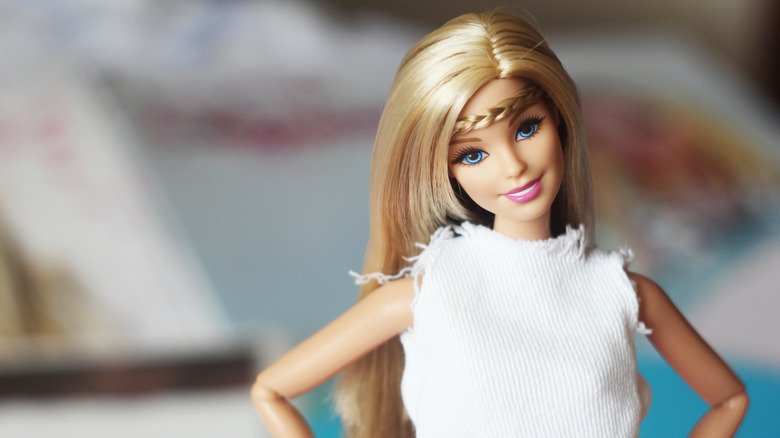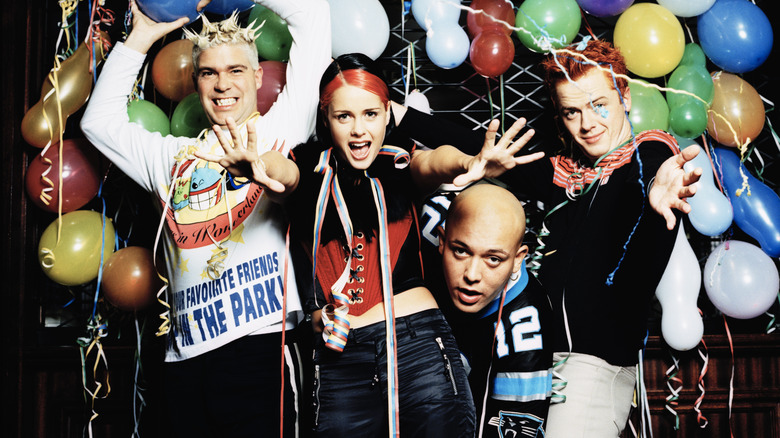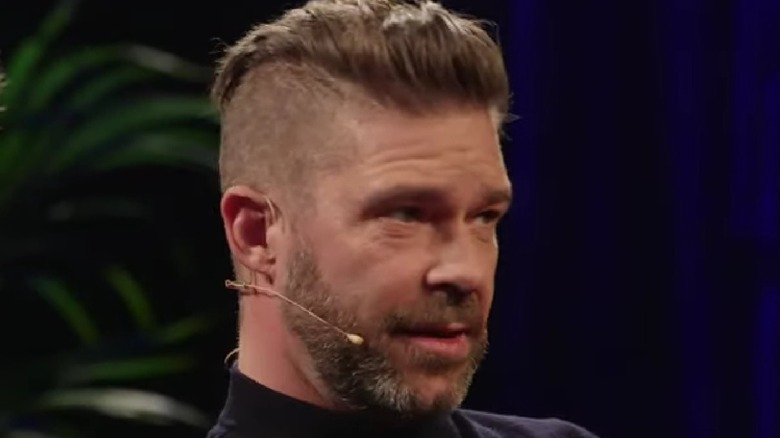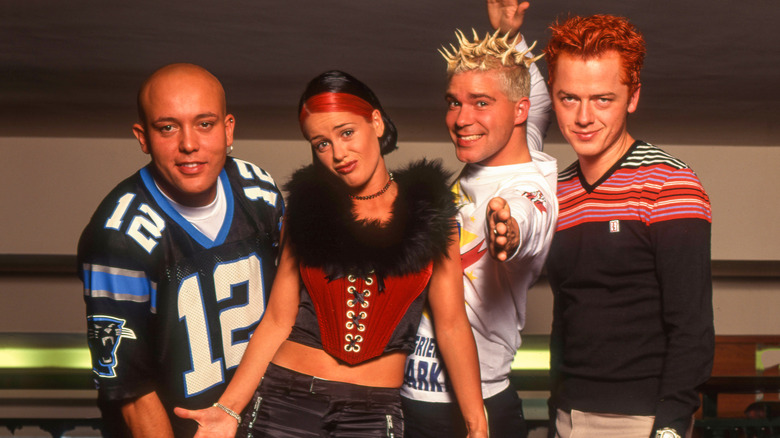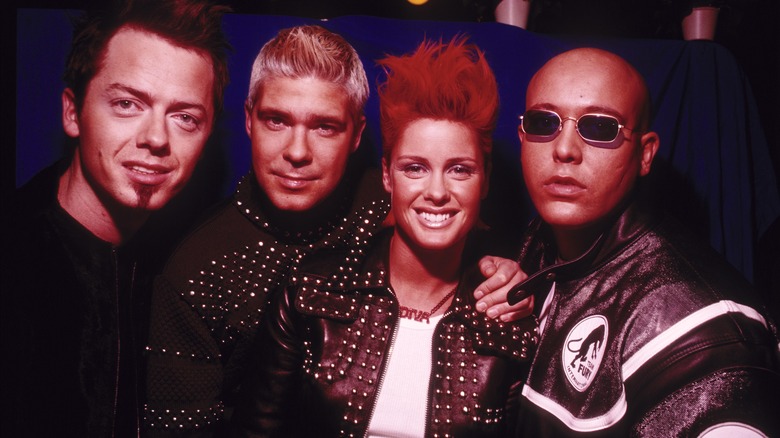What Happened To The Band Aqua?
The '80s tend to get all the credit for being the quirkiest decade for popular music, but those who were around in the '90s remember that the decade wasn't exactly short on quirk, either. It was a time, put simply, during which weird was in style. (And style was weird, but that's another story.)
In 1997, that weirdness arguably hit its apex, or its nadir, depending on whom you're asking. In September of that year, "Barbie Girl," a thin, bouncy ode to life in plastic (it's fantastic) debuted on the Billboard charts — and stayed there for 16 weeks, peaking at No. 7 in the United States. It also rocketed right to No. 1 in about a dozen other countries, and you may remember it either as a fun little piece of pop fluff or as one of the most annoying hit songs ever recorded. The band behind the song is Danish outfit Aqua, comprised of vocalists Lene Nystrøm and René Dif, keyboardist and percussionist Søren Rasted, and guitarist Claus Norreen. They're considered to be the definition of a one-hit wonder in the states, but this is not quite correct; they had one other top 40 single, "Lollipop (Candyman)," which peaked at No. 23. Oh, also, they're the single best-selling Danish band of all time with about 33 million units sold — and if you knew that, you are either Danish, very knowledgable about international pop tunes, or lying through your teeth. Here's what they've been up to.
The band thinks their American label fumbled the follow-up single
Once Aqua joined the ranks of international bands whose debut U.S. singles just blew up all over the place, the band's stateside fortunes rested in the hands of its label, Universal-MCA. In regions where "Barbie Girl" had similarly gone nuclear, the follow-up singles like "Doctor Jones" and "My Oh My" had generally done pretty well; in the United Kingdom, "Doctor Jones" even landed the band a second No. 1 single. But in the states, Universal inexplicably decided to follow "Barbie Girl" with a tune that even the band wasn't particularly fond of: the aforementioned "Lollipop (Candyman)," which failed to crack the top 20.
A quarter-century later in 2022, speaking with Rolling Stone about their all-too-brief flirtation with American superstardom, the band members still sounded pretty peeved about the decision. "We didn't think that song was a hit," said Søren Rasted. "That was a weird decision." Lene Nystrøm was a touch more verbose on the subject. "I think maybe 'Doctor Jones' would have been a better choice in America, but there was so much politics at that point," she said. "There were a lot of cooks in the kitchen, a lot of people that wanted to be a part of it, but the second single should have been left to us to decide." "Lollipop" marked the last time Aqua even sniffed the American charts — until 2023, when Nicki Minaj and Ice Spice's "Barbie World" (from the soundtrack to Greta Gerwig's "Barbie") handed the band a second top 10 hit by virtue of sampling "Barbie Girl."
Their second album was huge overseas
"Barbie Girl" helped to make Aqua's debut album, "Aquarium," a triple-platinum smash in the U.S., and of course it also sold approximately a gazillion units (well, about 11 million, anyway) overseas. Any successful musician will tell you it's tough to follow up that kind of success, and sure enough, the band's follow-up LP — 2000's "Aquarius" — was a bit of a letdown. That is to say, it barely registered a blip on the radar in the U.S., peaking at No. 82 on the Billboard chart. Its international sales, though, were nothing to sneeze at — it moved about 1.7 million copies, qualifying for platinum status in eight countries.
"Aquarius" even spawned some significant hit singles overseas, including "Cartoon Heroes," which was the top single in Denmark in 2000, and "Around the World," which cracked the top 10 and stayed there for 15 weeks. As sophomore slumps go, it wasn't the worst, and the band might have been poised for future success — but unfortunately, right about the time "Aquarius" dropped, the band had to deal with a pretty major distraction in the form of a bunch of lawyers for an international corporation, a circumstance that just might have contributed to the derailment of the Aqua train.
The band faced a lawsuit over Barbie Girl
In 2000, the Mattel Corporation — manufacturers of the Barbie Doll and all of her various associates and accessories — finally became aware of Aqua's hit tune, which contained such salacious lyrics as "You can brush my hair, undress me everywhere" and "I'm a blonde bimbo girl in a fantasy world," apparently in reference to their squeaky-clean creation. Looking straight past a disclaimer on the liner notes for "Aquarium" stating explicitly that Mattel did not in any way endorse the song, the company's head honchos threw down their hats and stomped on them, then filed a lawsuit against MCA claiming ... well, anything its lawyers could think of.
Speaking with Rolling Stone, the band's lawyer Russell Frackman — presumably failing to keep a straight face — said, "The lawsuit had 11 different claims. They pretty much threw the kitchen sink at us ... They even claimed that [Aqua] infringed on what they called 'Barbie Pink.'" Lene Nystrøm called the suit "hilarious," pointing out that it only served to raise the song's profile yet further, while Søren Rasted put on his conspiracy theory hat to claim that the whole thing was organized between Mattel and MCA for publicity. In any event, after two years of litigation, Judge Alex Kozinski ruled in favor of the music label in 2002, concluding his opinion with the illest mic drop to ever be issued in a judicial ruling: "The parties are advised to chill." In a bizarre footnote to the whole thing, Mattel in 2009 licensed "Barbie Girl" (with modified lyrics, of course) to use in a new Barbie advertising campaign. Nystrøm's response to this was elegant in its simplicity: "That's what they should have done from the start."
They split up when it seemed they were just getting started
Getting dragged into court over their biggest hit would be enough to take the wind out of the sails of any band, but initially, the whole kerfuffle didn't seem to bother the members of Aqua too much. As reported by Billboard, in the middle of the whole thing in 2001, the band was playing festivals in Scandinavia, trotting out new material for a third album, which they claimed would be coming forthwith. However, it was also reported at the time that the individual members were at work on solo projects — and in August of that year, Aqua surprised its fans by calling it quits, though it was made clear that the split might only be temporary.
In a statement, the band said, "We have looked each other straight in the eye and reached the conclusion that, for the moment, the spark is missing." Lene Nystrøm and René Dif were said to be focusing on their solo work, while Søren Rasted and Claus Norreen intended to continue working together, with the door left open for a reunion at some indeterminate point down the road. That third album the band had been teasing was scuttled — and the next time Nystrøm dropped new music, it was as a solo artist.
Lene Nystrom took a shot at a solo career
In 2003, Lene Nystrøm stormed back onto the pop scene with her solo LP "Play With Me." Well, she didn't storm so much as she sort of hesitantly tip-toed back onto the pop scene, and the record was met with a less-than enthusiastic response. Actually, that's not quite accurate — it was met with virtually no response, with the single "It's Your Duty" failing to even come within shouting distance of the U.S. or U.K. pop charts. Unsurprisingly, the album remains Nystrøm's only solo effort to date.
This time period wasn't all bad news for the singer, however. She received a writing credit on the single "No Good Advice" by U.K. girl group Girls Aloud, a No. 2 single in the band's home country. Years later, Girls Aloud would honor Nystrøm's contribution to their success in an interesting fashion: their 2008 LP "Out of Control" featured as a bonus track a cover version of "We Wanna Party," a deep cut from "Play With Me."
Soren Rasted tried to start a new genre
While Lene Nystrøm played it safe with her solo effort, sticking to the dance-pop that made her famous, Søren Rasted decided to take a big swing with his post-Aqua project, which he called Lazyboy (and, later, Lazy B). He didn't just switch up genres — he made a full-on attempt to invent a new one, which he called "Rhythm'n'Speak." The new genre might have been behind the 8-ball from the beginning, saddled as it was with a name that sounds like a toddler's electronic toy, but it was the substance of its aesthetic that doomed it to failure: hip-hoppy beats accompanied by spoken word samples of TV news broadcasts, random people on the street (via interviews conducted by Rasted himself), game shows, and whatever other weirdness struck Rasted's fancy.
Reviews of the 2004 LP, titled "Lazyboy TV," were absolutely brutal, while still singling out for praise its lead single, the undeniably brilliantly titled "Underwear Goes Inside the Pants." That tune, if it can be referred to as such, managed to crack the top 40 in the U.K., which constituted Rhythm'n'Speak's one brief moment in the spotlight before it faded away forever.
A third studio album finally materialized in 2011
Perhaps realizing that their fan base preferred them to be making music, you know, together, Aqua ended their hiatus as the aughts drew to a close. In 2009, the band debuted three new singles in support of their Greatest Hits release (two of which cracked the Danish top 10), and in 2011, they dropped "Megalomania," their first studio album in over a decade. The album sported a more mature sound, with slightly more adult themes than being a Barbie Girl in a Barbie World, and fans in the band's home country were receptive, with the record going to No. 2 there. The album's singles "How R U Doin?" and "Playmate to Jesus" both charted inside the top 20 in Denmark, and reflecting Aqua's new mature-yet-playful aesthetic, the final track sported the band's greatest song title ever: "If the World Didn't Suck (We Would All Fall Off)."
In an interview with Renowned for Sound, the band explained that their new approach wasn't so much a reinvention as a natural progression. "We like to keep the Aqua sound new and refreshing and interesting," said René Dif. "We will always be a pop band that will always be in your face. We tried to do a balance between doing a good pop song and keeping things current." Dif also acknowledged that the continued support of their fan base made it a no-brainer to ditch the solo sojourns and give them what they wanted. "Our fans are a big part of us getting back together and staying together," he said. "There is still a lot of nostalgia and demand for Aqua music."
They lost a founding member in 2016
After two decades as a four-piece, Aqua became a trio in 2016, when Claus Norreen — who founded the group along with Søren Rasted way back in the mid-'90s — decided to depart for personal reasons. The band insisted that the split was amicable, but it's pretty clear that Norreen is pretty well done with the whole Aqua thing; when Rolling Stone interviewed them for its oral history on "Barbie Girl" in 2022, Norreen was the only party involved with the song who failed to respond to the outlet's request to take part.
Rasted, though, seems to think the guitarist might return at some point. "There were a lot of reasons Claus left, but not serious ones. It wasn't like he was going to kill us, or anything," he explained. "I think he needed a break." For Lene Nystrøm's part, there seemed to be some decidedly mixed feelings on Norreen's absence. "I miss Claus in the group. He was my musical soulmate onstage ... It was really sad when he left," she said. "But I have to say that the dynamics within us three are really, really amazing. And so on a general basis, I don't miss him today."
They still tour and are working on a fourth album
Since the release of "Megalomania" over a decade ago, the band has been a near-constant presence on music festival stages and nostalgia tours around the world. While the fact that they've sold a ridiculous number of records means that all of its members likely have no pressing financial need to continue performing, they do so anyway, and at a steady clip — the band played eight festival dates in 2022 alone and are still touring the U.S. into 2023. The reason for this is simple: Aqua band members are fully committed to their concept, and that concept just works best live. In their conversation with Rolling Stone, René Dif said, "Every time we play, there are hardcore fans and new fans. When they see us perform, they understand the whole concept of Aqua. We're a pretty wild band when we play. We sometimes say that we're performing like a rock band ... We kick ass every time."
The band also revealed that a fourth, long-awaited album is on the way, with work having begun in the middle of lockdown in 2021. Lene Nystrøm shared that while fans can expect a continued maturation of their sound, they should not look for the band to swing too hard away from the aesthetic that made them famous. "Søren wants it to be a little more serious. I'm like, 'Nope. I want happy music. Come on, dude, you can do it,'" she said. "I'm hoping he hears me. Nobody wants dark music from Aqua. Let's just agree on that."
They have a complicated relationship with Barbie Girl
When you've reached the pinnacle of pop stardom with a song as ... well, singular as "Barbie Girl," you're bound to have a lot of contradictory feelings about that song, and this is certainly the case for Aqua. In their Rolling Stone sitdown, the band admitted that having a legacy so closely tied to one song is a mixed bag; can it get a little bit tiring being obliged to play "Barbie Girl" every single time they perform? Yes, of course it can. Do they play it anyway, every single time? Yes, of course they do. Said Søren Rasted, "Sometimes three times in a row is a lot. But I feel so fortunate that everybody pretty much in the whole world knows that song." Lene Nystrøm concurred, saying, "I feel really proud of the song. I have to admit there were times back in the days where I was like, 'Oh, my God, not again.'"
Rasted also noted the incorrectness of the "one-hit wonder" label, pointing out the overseas success of "Doctor Jones" and "My Oh My," before pretty much just owning the label anyway. "I've never felt like a one-hit wonder ... [but] that song is a gift. I won't be bothered by that even though lot of people probably want to kill us." Nystrøm then further acknowledged the elephant in the room in hilarious fashion, saying, "I can totally understand people getting pissed at ["Barbie Girl"]. It can be super annoying. It sticks like glue."
